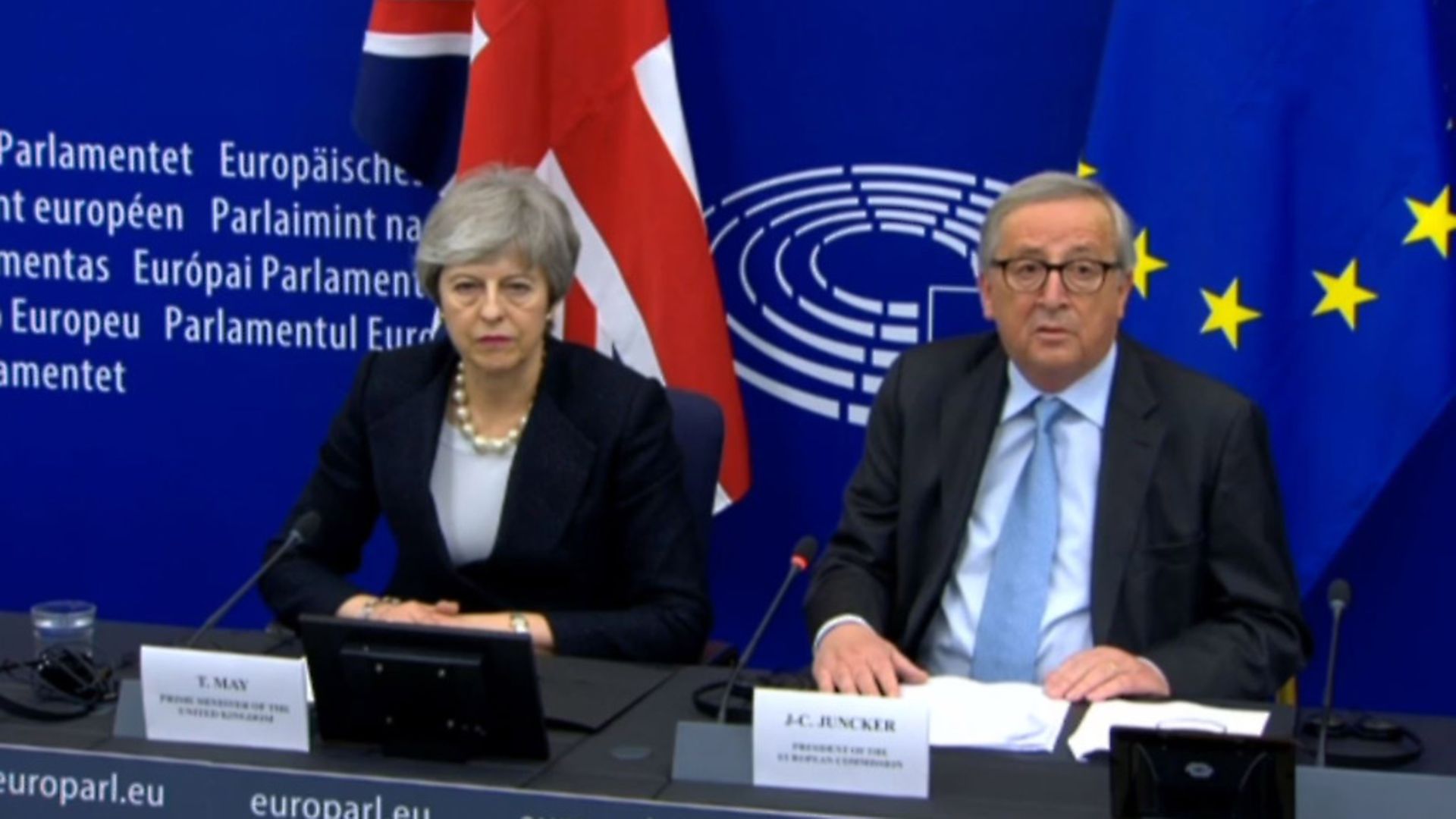
Theresa May insists she has secured ‘legally binding’ changes to the Brexit deal which she hopes will appease Brexiteer MPs in her party and the DUP.
Following last-ditch talks in Strasbourg ahead of a crunch Commons vote May said she has now delivered what Parliament asked her to do.
The PM said she ‘passionately believed’ her Brexit deal addressed concerns raised by MPs who feared the backstop would keep the UK in a customs arrangement with the EU indefinitely.
At a joint press conference with European Commission president Jean-Claude Juncker, May said the three new documents agreed provided the legal assurances critics of her stance had called for.
The PM said: ‘What we have secured is very clearly that the backstop cannot be indefinite. Cannot become permanent. It is only temporary. If it is the case that we were ever to get into the backstop.
‘The legal instrument that we have agreed is an addition to the Withdrawal Agreement. It has the same legal status as the Withdrawal Agreement. It is legally binding.
‘That is what parliament asked us to secure and that is what we have secured.’
May added: ‘MPs were clear that legal changes were needed to the backstop. Today we have secured legal changes.
‘Now is the time to come together to back this improved Brexit deal and to deliver on the instruction of the British people.’
The legal view of the changes taken by Attorney General Geoffrey Cox will be an important factor in the lead-up to the Commons vote.
May said: ‘The Attorney General is independent. He will come to his decision. He will publish his legal opinion.’
The European Commission president insisted there would be no further negotiations on the issue.
Juncker said: ‘There will be no new negotiations. It is this.
‘In politics, sometimes you get a second chance. It is what we do with the second chance that counts. Because there will be no third chance.
‘There will be no further interpretation of the interpretations and no further assurances on the reassurances.
‘Let us be crystal clear about the choice – it is this deal or Brexit might not happen at all.’
May believes the three new documents agreed with Mr Juncker will give MPs the legally-binding reassurances they require to approve her Withdrawal Agreement and Political Declaration on the future EU/UK relationship.
The Commons motion the PM wants MPs to back describes the first new document as ‘the legally binding joint instrument’ relating to the Withdrawal Agreement.
The DUP has pledged to carefully analyse the Brexit deal add-ons, remaining non-committal on whether it would now back the Withdrawal Agreement.
Deputy leader Nigel Dodds told the Commons ‘all of this will need to be taken together and analysed very carefully’.
Jacob Rees-Mogg, chairman of the European Research Group, told the BBC: ‘It’s too early to tell definitively, but it’s clearly a step in the right direction.
‘It’s important to see the details, but the DUP’s support would be a very important and significant factor.’
The prime minister’s de facto deputy David Lidington said that the new documents gave ‘confirmation that the EU cannot try to trap the UK in the backstop indefinitely and that doing so would be an explicit breach of the legally-binding commitments that both sides have agreed’.
But Labour leader Jeremy Corbyn dismissed the move and called on MPs to reject the deal.
He said: ‘The prime minister’s negotiations have failed.
‘This evening’s agreement with the European Commission does not contain anything approaching the changes Theresa May promised parliament, and whipped her MPs to vote for.
‘Since her Brexit deal was so overwhelmingly rejected, the prime minister has recklessly run down the clock, failed to effectively negotiate with the EU and refused to find common ground for a deal parliament could support.’
The 11-strong Independent Group of MPs has tabled an amendment to force the PM to seek an extension of Article 50 to hold a People’s Vote before the end of September.
In a letter to EU Council president Donald Tusk, Juncker left the option of an extension to Article 50, but only by a could of months.
He said: ‘I would like to stress that the United Kingdom’s withdrawal should be complete before the European elections that will take place between 23-26 May this year.’
Warning: Illegal string offset 'link_id' in /mnt/storage/stage/www/wp-includes/bookmark.php on line 357
Notice: Trying to get property 'link_id' of non-object in /mnt/storage/stage/www/wp-includes/bookmark.php on line 37






